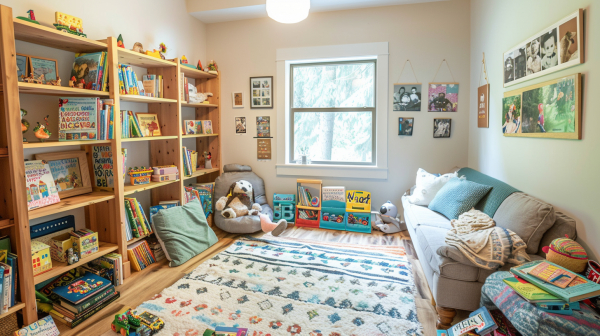A nurturing environment can have a significant impact on a child's life. Such an environment is essential for foster children, who often face uncertainties and transitions. We'll explore five foundational steps that pave the way for fostering resilience and growth in these young lives.
Step 1: Establish Stability and Safety
Creating a stable and safe environment is the cornerstone of nurturing for foster children. It's vital for these kids, who may have faced upheaval and trauma, to feel secure in their new surroundings. Statistics show that 57,540 children are living with foster families in England, which represents 70 per cent of the children in care, highlighting the need for secure environments.
Here are some practical ways to establish stability and safety:
- Maintain a consistent daily routine, providing predictability in their lives.
- Ensure the child has a space of their own, which they can personalise and control.
- Set clear, age-appropriate boundaries and rules that provide structure.
Step 2: Foster Emotional Connections
Trust and emotional bonds are crucial for children who may have experienced broken attachments or trauma. Emotional connections can provide a healing touch, offering foster children the relational security they need. A significant number of these children, 53%, are reunited with their families or placed with relatives, emphasising the importance of maintaining family ties and building new emotional relationships.
To foster these connections:
- Spend quality time with the child, engaging in activities they enjoy.
- Listen actively and validate their feelings, showing they are heard and valued.
- Be patient and persistent, as building trust can take time.
Step 3: Address Mental Health Needs
Addressing the mental health needs of foster children is a critical step in creating a nurturing environment. With up to 80% of children in foster care experiencing significant mental health issues, it is clear that these needs are a priority. As caregivers, we must advocate for and provide access to mental health services when needed.
To address these mental health needs:
- Be observant of any signs of distress or behavioural changes that may indicate mental health struggles.
- Foster open communication about mental health, normalising discussions around it.
- Collaborate with professionals to ensure the child receives the support they need.
Step 4: Promote Educational and Personal Growth
Promoting educational and personal growth is crucial for foster children, as education is a key factor in their future success and stability. While providing a nurturing environment, supporting their love for learning and educational efforts is essential.
To promote educational and personal growth:
- Take an active role in their academic activities and celebrate all achievements.
- Offer a quiet and specific area for homework and study to help focus and learn.
- Support extracurricular activities that match their interests, fostering skill development and self-esteem.
Step 5: Encourage a Sense of Belonging
Cultivating a strong sense of belonging is vital for foster children to feel confident, adaptable, and open to new challenges. Feeling part of a family can greatly affect their growth and future relationships.
To encourage a sense of belonging:
- Include the child in family traditions and rituals, affirming their role in the family.
- Promote interactions with peers and community groups, aiding in the formation of a support network.
- Acknowledge their history and culture, respecting their past as part of their identity.
Creating a nurturing environment for foster children involves ensuring stability, emotional connection, mental health, education, and a sense of belonging. Each step is critical and interconnected, contributing to the holistic well-being of foster children. By committing to these five steps, caregivers can lay a foundation for foster children to develop, learn, and succeed. This commitment to our children's futures is a responsibility and an opportunity to shape the next generation's members of society.
Are you thinking of becoming a foster carer? Explore the transformative fostering journey – Start your fostering adventure with Family Fostercare today.

